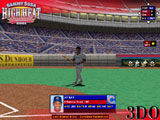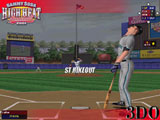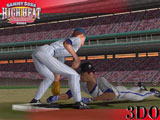 |
|
|
 Even
though we’re being treated to one of the best NCAA tournaments ever,
sports fans are also aware that the end of the college basketball season
signals the beginning of baseball season. With opening day just around the
corner, it’s time to start reading up on off-season moves and get those
fantasy league cheat sheets ready. It’s also time to get ready for the
annual flood of PC baseball games. The first game out of the gate this
year is 3DO’s Sammy Sosa High Heat Baseball 2001 (as unwieldy a name as
you could ask for). Even
though we’re being treated to one of the best NCAA tournaments ever,
sports fans are also aware that the end of the college basketball season
signals the beginning of baseball season. With opening day just around the
corner, it’s time to start reading up on off-season moves and get those
fantasy league cheat sheets ready. It’s also time to get ready for the
annual flood of PC baseball games. The first game out of the gate this
year is 3DO’s Sammy Sosa High Heat Baseball 2001 (as unwieldy a name as
you could ask for).  This is the third
year for the High Heat franchise, and it’s a vintage one. Developed by
Team .366, a dedicated bunch of self-described baseball nuts, the first
two games of the series were excellent and realistic, but hampered
somewhat by bugs. Nevertheless, High Heat Baseball’s combination of
solid graphics, deep statistical models, and spot-on gameplay made them
the clear choice of baseball aficionados. In one of those cosmic
injustices, however, High Heat never sold in the numbers it should have.
Even worse, it was spectacularly outsold by EA’s mega-hyped, arcadey,
and slipshod Triple Play games—the name of which alone makes SABRE
members gag. Stung by this,
3DO pulled a brilliant marketing move and stole last year’s Triple Play
spokesman, Sammy Sosa. I know that in a perfect world shiny pictures of
celebrities wouldn’t sell baseball games, but in this one they do, and
the difference between last year’s rather plain High Heat box and this
year’s flashy edition should make a big difference in sales. Usually I
don’t approve of this sort of thing, but I do in this case--because if
Sammy’s picture gets one more person to buy High Heat Baseball 2001,
it’s one more gamer who will play what is the best PC baseball game ever
made—and one of best video games ever made, period. This is the third
year for the High Heat franchise, and it’s a vintage one. Developed by
Team .366, a dedicated bunch of self-described baseball nuts, the first
two games of the series were excellent and realistic, but hampered
somewhat by bugs. Nevertheless, High Heat Baseball’s combination of
solid graphics, deep statistical models, and spot-on gameplay made them
the clear choice of baseball aficionados. In one of those cosmic
injustices, however, High Heat never sold in the numbers it should have.
Even worse, it was spectacularly outsold by EA’s mega-hyped, arcadey,
and slipshod Triple Play games—the name of which alone makes SABRE
members gag. Stung by this,
3DO pulled a brilliant marketing move and stole last year’s Triple Play
spokesman, Sammy Sosa. I know that in a perfect world shiny pictures of
celebrities wouldn’t sell baseball games, but in this one they do, and
the difference between last year’s rather plain High Heat box and this
year’s flashy edition should make a big difference in sales. Usually I
don’t approve of this sort of thing, but I do in this case--because if
Sammy’s picture gets one more person to buy High Heat Baseball 2001,
it’s one more gamer who will play what is the best PC baseball game ever
made—and one of best video games ever made, period.  One of the best
things about SSHH2K1 is its amazing number of options. If you want to play
a single game, you can. If you want to play a full season, no problem.
Career mode? You bet. And even within these options, there are scads of
other ones. You can manage your minor leagues and make trades in career
mode or leave it to the computer. You can play with authentic rosters or
draft a fantasy league. In games, you can choose from five levels of
difficulty, but even within those levels you can decide whether you’ll
control your team’s hitting, pitching, fielding, running, and defensive
alignments. In other words, if you want to play an exactingly realistic
game of baseball and micro-manage like Tony LaRussa, you can. But if you
want to take a nap on the bench, a la Don Zimmer, you can do that, too.
This makes it a lot easier for beginners to get into than last
year’s version, which was a bit too much for neophytes, including my
kids. I was a concerned that this would again be the case with SSHH2K1,
and that the lads would be stuck playing nothing but the game’s
enjoyable-but-arcadey Home Run Derby. However, the game’s
“scalabilty” allowed me to start them off at rookie level and slowly
introduce more features until they’re now regularly whipping up on ol’
da. One of the best
things about SSHH2K1 is its amazing number of options. If you want to play
a single game, you can. If you want to play a full season, no problem.
Career mode? You bet. And even within these options, there are scads of
other ones. You can manage your minor leagues and make trades in career
mode or leave it to the computer. You can play with authentic rosters or
draft a fantasy league. In games, you can choose from five levels of
difficulty, but even within those levels you can decide whether you’ll
control your team’s hitting, pitching, fielding, running, and defensive
alignments. In other words, if you want to play an exactingly realistic
game of baseball and micro-manage like Tony LaRussa, you can. But if you
want to take a nap on the bench, a la Don Zimmer, you can do that, too.
This makes it a lot easier for beginners to get into than last
year’s version, which was a bit too much for neophytes, including my
kids. I was a concerned that this would again be the case with SSHH2K1,
and that the lads would be stuck playing nothing but the game’s
enjoyable-but-arcadey Home Run Derby. However, the game’s
“scalabilty” allowed me to start them off at rookie level and slowly
introduce more features until they’re now regularly whipping up on ol’
da.
This combination of
realism, fun, and insight into the game also extends to High Heat’s play
in the field. Like hitting and pitching, fielding, throwing, and running
are easy to control, extremely realistic, and vastly entertaining.
Again, the wide variety of options available allows you to take as
much or as little control in the field as you want. Some of last year’s
more problematic on-field glitches-- including a puzzling amount of balls
that caromed off the walls for mere singles and a dearth of double
plays—have been remedied. It’s
still a challenge to turn a double play, but it can be done.
But the best thing about High Heat’s gameplay
is how much it seems like real baseball. Things can go splendidly
for seven innings, and then a fielding error, an overthrow and a missed
cutoff man in the eighth can lose the game for you. Though my favorite
way to play High Heat multiplayer is hotseat (the better to taunt one’s
opponent), its multiplayer options include LAN and internet, as well as
over HEAT. For years, I have
insisted that Earl Weaver Baseball was the best baseball game ever. Last
year’s High Heat almost changed my mind. This year’s Sammy Sosa’s
High Heat 2001 has wholeheartedly converted me. This game is an instant
classic—not just a great baseball or even sports game, but a great game,
period. From now on, picking
up a copy of High Heat Baseball will be as much of an annual baseball
ritual for me as picking the Cubs to win their division. That way, at
least one of my picks will be the right one. |